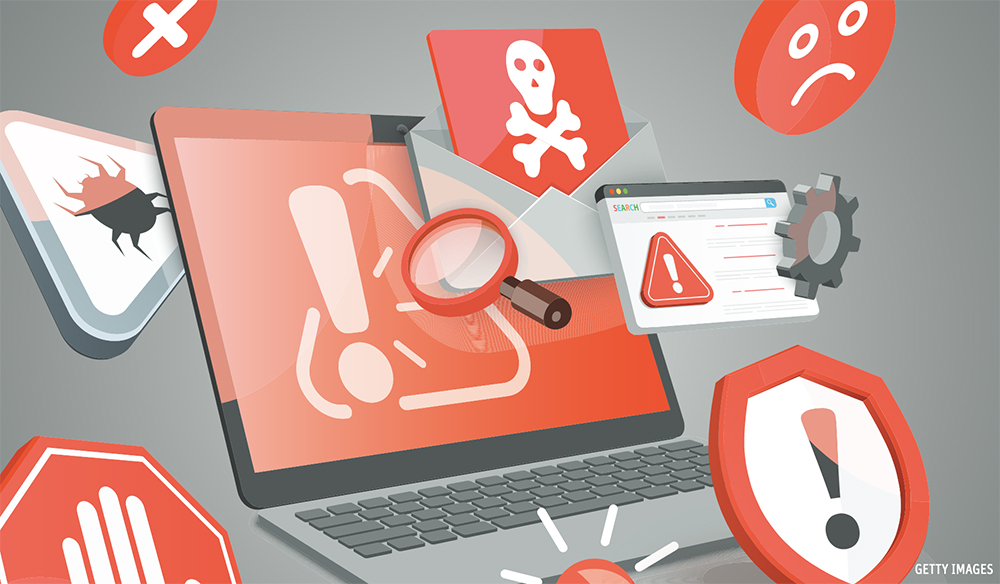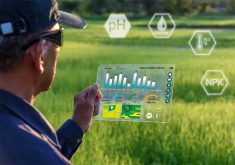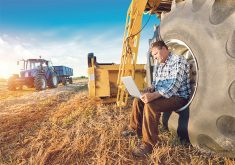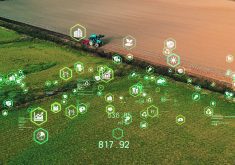Cyberattacks and unethical use of data are problems that everyone from producers and governments to agricultural technology providers need to take seriously, says a researcher.
“My background is artificial intelligence. I support use of data, I’m not against that,” said Rozita Dara, an associate professor at the School of Computer Science at the University of Guelph in Ontario.
“But make sure that it’s being done the right way. And technology brings lots of excitement, but at the same time, we have to be able to understand the negative impact and control it.”
Read Also

Canadian Food Inspection Agency extends chronic wasting disease control program consultation deadline
Date extended for consultation period of changes to CWD program
Dara is part of a group of computer science researchers and food experts at the university who have recently published several papers on big data privacy and smart farm information processing. Such farms use sensors to gather data ranging from soil and irrigation to livestock, said a university statement.
Machine learning and data-mining technology that are part of the artificial intelligence used to analyze this information helps farmers improve their productivity. However, it means producers are ceding more control to electronic devices.
“Can we build technologies that are more transparent and that consider human beings?” Dara said in the statement. “Farmers want to know how decisions are being made. Bringing the human aspect into the loop makes them trust the system more.”
Such trust is critical to the development of smart farming, which could help feed the world’s growing population, she said. “If farmers feel they lack control over their own information, they will resist implementing these systems,” said the statement.
Dara said in an interview such questions are coming at a time when many producers likely aren’t even aware of the importance of following basic digital security practices, such as changing their passwords from the default settings or regularly updating their software.
More than 90 percent of privacy and security breaches are due to human error, she said.
“And many of them could be prevented.”
Cybercriminals targeting an increasingly digitalized agriculture and agri-food industry aren’t the potential outcome of a distant hypothetical future. JBS, which is the world’s largest meat-processing corporation, was hacked in 2021 by the Russia-linked REvil ransomware gang.
It caused the temporary closure of nine plants, disrupting meat processing across North America and Australia, said a paper about on-farm data security co-authored by Dara. They included the JBS facility in Brooks, Alta., which processes about a third of all beef in Canada.
”Cybersecurity for the food supply chain is absolutely important,” Dara said in the university statement. “If intruders — say, state- or non-state-funded hackers — disrupt the supply chain, that would be a disaster.”
REvil forced JBS to pay a ransom equivalent to $11 million to keep the company’s files safe.
“Just as farmers work to protect their crops and livestock from pests and disease, technology providers, governments and farmers need to recognize the potential risks associated with cyberattacks and data misuse that come with ever more pervasive smart farming technology,” said the university statement.
There needs to be a multi-stakeholder approach to the governance of digital agriculture, said Dara.
“Farmers and farm managers need to take cybersecurity seriously. They need to think about what could go wrong.”
IBM has estimated that four million data points per day will be generated on the average farm by 2036, up from 500,000 in 2019, said the paper co-authored by Dara. Meanwhile, the precision farming market is expected to increase to US$15.6 billion by 2030, up from the current $8.5 billion, it said.
“Precision farming can be compromised by threats to data acquisition technologies and increased cyberattacks on farming systems,” said the paper.
Security breaches can allow hackers to control such systems, resulting in the sabotage of farm data or other assets, it said. Co-ordinated attacks can lead to the stealing of data, loss of proprietary information such as contracts or security design, disruption to the supply chain, and loss of reputation as well as financial loss, it added.
Dara said in the interview the increasing use of artificial intelligence to extract and analyze patterns in data collected from farms could also pose problems for producers.
“Processors, for instance, may gain financial benefits that may not be shared with farmers,” said the university statement.
There needs to be transparency about how data is being gathered and analyzed that includes consent by producers, said Dara. It is akin to what regulators have expected for the personal data of average people in society at large, she said.
It was revealed in 2018 that British consulting firm Cambridge Analytica had collected and analyzed the data of millions of Facebook users without their consent for purposes such as political advertising. It resulted in a $5-billion fine being levied on Facebook in 2019 by the U.S. Federal Trade Commission.
Another problem facing producers is the reliability and safety of decisions based on artificial intelligence, which can be compromised if the algorithms at the heart of the technology are fed low-quality data that results in biases, said Dara.
“So, the issue is when the decision is wrong, somebody will be affected, so they have to be very careful about the accuracy of (artificial intelligence) tools at the farm.”
There needs to be clear accountability so that the people who built the algorithms are held responsible for any mistakes, not producers, she said. However, farmers could face an imbalance of power over this issue whose potential extent is “quite significantly unknown,” she added.
“So, there are groups that have access to algorithms and data, and there is another group who may have access to data a little bit, but they have no idea how to use it or how it’s being used…. We have to ensure the ones that have more power are not misusing it.”
What she described as “dark pattern” uses of digital technology could potentially happen to farmers in ways that affect the entire food supply chain.
“It hasn’t been that advanced, to be honest with you,” she said.
“But we are thinking about five years from now, we are thinking about 10 years from now, that’s how farm data could be used … and I can’t even imagine it right now, but I’m pretty sure this will become a challenge.”
















